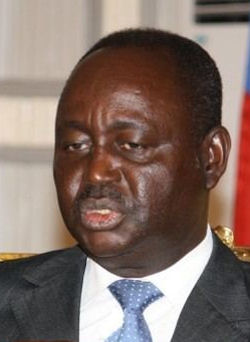Coalition of Patriots for Change (CPC)
 François Bozizé, former president of the Central African Republic (CAR), had agreed in February to become the “general coordinator” of the rebel alliance aiming to overthrow the central government, according to the coalition’s spokesman 21 March 2021. The coalition brought together six of the armed groups that control much of the country in mid-December 2020 to launch the offensive against Touadéra, just more than a week before the December 27 presidential and legislative elections.
François Bozizé, former president of the Central African Republic (CAR), had agreed in February to become the “general coordinator” of the rebel alliance aiming to overthrow the central government, according to the coalition’s spokesman 21 March 2021. The coalition brought together six of the armed groups that control much of the country in mid-December 2020 to launch the offensive against Touadéra, just more than a week before the December 27 presidential and legislative elections.
Bozizé had seized power in a 2003 coup but was removed 10 years later, an act that sparked a brutal civil war that killed thousands of people and tipped CAR further into instability. The country’s current government accused him of being behind a recently failed offensive by the so-called Coalition of Patriots for Change (CPC) against President Faustin-Archange Touadéra, who won re-election in a December 2020 vote marred by insecurity and low turnout.
In December 2012, the Séléka armed alliance advanced across CAR in opposition to then-President François Bozizé. On March 24, 2013, Séléka fighters entered Bangui, effectively seizing control of the country and triggering a period of widespread violence. After more than six years of conflict, the CARG and 14 armed groups signed the Political Agreement for Peace and Reconciliation on February 6, 2019. Despite initial progress on the dialogue and scheduling of national elections for December 2020, direct clashes between armed groups, insecurity and attacks against civilians and UN peacekeeping forces, and security incidents affecting humanitarian workers continue in multiple regions of the country. On January 18, the Constitutional Court validated the results of the December 27, 2020 election, resulting in President Touadéra assuming a second term in office despite a concerted effort to disrupt voting and seize major urban areas by armed groups aligned with former president Bozizé, whom the Constitutional Court determined was ineligible for candidacy.
The security situation in the Central African Republic significantly deteriorated following the invalidation of former president François Bozizé's candidacy for presidential election by the Government of CAR (CARG) Constitutional Court. Rebels in the Central African Republic (CAR) seized Bambari, the country's fourth-largest city, as clashes broke out 21 December 2020 on a key highway in the west of the country five days before nationwide elections. The attacks follow the government's accusations that former president Francois Bozize was seeking to mount a coup with armed groups ahead of upcoming elections. At CAR's request, Russia and Rwanda sent military personnel to support the troubled country. "The town is under the control of armed groups," Bambari Mayor Abel Matchipata said, while a senior government official confirmed, "they are in the town, we are waiting for reinforcements, which are on their way."
The rebels were led by an armed group called the Unity for Peace in Central Africa (UPC), one of the militias contesting the government in the run-up to the December 27 polls. Russia said it sent 300 military instructors to the country at the request of its leadership to help counter a surge in rebel violence ahead of elections.
Leading up to the December 2020 presidential election in CAR, a coalition of six armed groups united to form the Coalition of Patriots for Change (CPC). Aligned with Bozizé, the CPC engaged in a prolonged offensive to seize control of major urban areas from CARG authorities. By mid-January, the CPC offensive had reached Bangui before being repelled by the Armed Forces of CAR (FACA), UN Multidimensional Integrated Stabilization Mission in CAR (MINUSCA) peacekeepers, and Russian and Rwandan forces supporting the CARG.
The election-related violence has constrained humanitarian access, displaced approximately 276,000 people within CAR, and prompted 109,000 civilians to seek refuge in neighboring countries. In addition, rising insecurity has exacerbated humanitarian needs across CAR, even as state security forces recapture territory formerly controlled by the CPC, the UN Office for the Coordination of Humanitarian Affairs (OCHA) reports. As of January 31, more than 725,000 people were displaced within the country, the highest number of internally displaced persons (IDP) in CAR since January 2014, according to the Commission on Population Movements, a non-governmental working group that tracks population displacement in CAR.
|
NEWSLETTER
|
| Join the GlobalSecurity.org mailing list |
|
|
|

